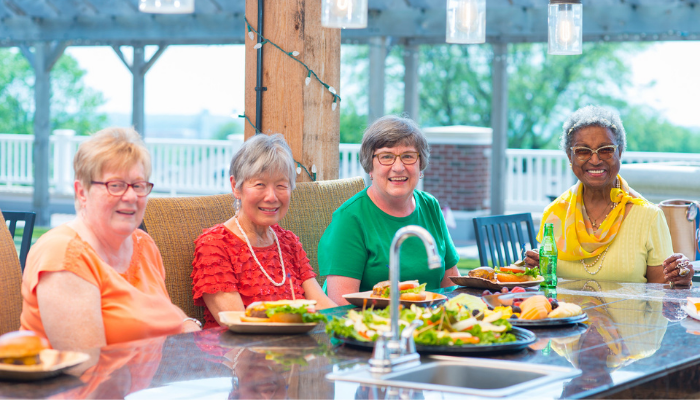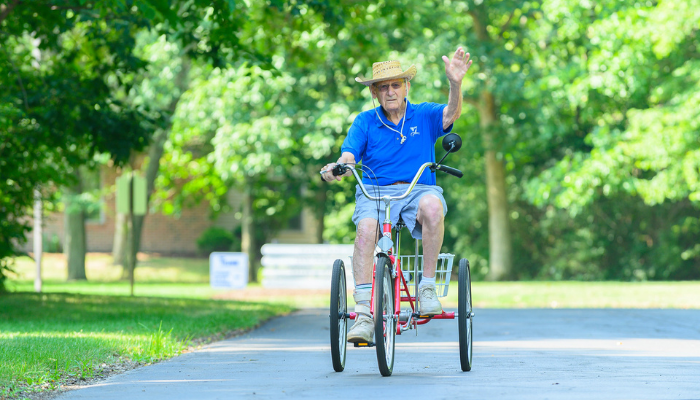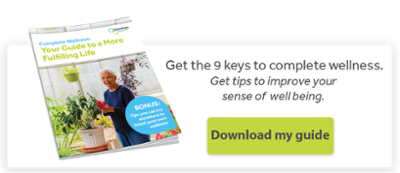While most of us often associate winter’s snow and ice with accidental injuries, certain summer conditions pose potential risks as well.
With sunny days and warm temperatures drawing us outdoors, here are seven precautions older adults can take to protect themselves from harm this summer.
1. Remain Hydrated
As we age, our risk of dehydration increases. The reason is twofold: first, our ability to conserve water declines over time and, second, our sense of thirst becomes less discerning. Hot and humid weather conditions can add to the problem by causing excessive perspiration.
Experts suggest consuming eight glasses of water or sports drinks throughout the day while avoiding dehydrating beverages containing alcohol and caffeine. Fresh fruits and vegetables are also good water sources. Remember, it is easier to stay hydrated than it is to rehydrate. So keep drinking.
2. Learn the Signs and Symptoms of Heatstroke
Heatstroke occurs when summer temperatures or strenuous physical activity cause your body to overheat.
Heatstroke symptoms include:
- Elevated core body temperature
- Rapid heart rate
- Dizziness
- Headache
- Confusion or irritation
- Nausea
We become less tolerant of sudden changes in body temperature as our bodies mature. Heatstroke is a life-threatening condition, so seek immediate medical attention if you experience any of its symptoms.
3. Limit Sun Exposure
Whatever our ages, the allure of sunshine calls us out to play. Whether you take a leisurely walk or toil in the garden, being outside on a sun-filled day can rejuvenate your spirit.
However, too much exposure to the sun’s harmful rays can lead to sunburn, infections, or skin cancer—especially on an older adult’s delicate skin.
Experts recommend applying sunscreen with a Sun Protection Factor of 30 or more (SPF 30) on exposed skin. If you plan on being outdoors for long periods, wearing clothing with built-in UV protection saves you having to reapply sunscreen throughout the day. Also, be sure to bring along a wide-brimmed hat and sunglasses.

4. Ask Your Doctor About Sun-Sensitizing Medication
Some prescription medications have side effects that can increase your skin’s sensitivity to UV rays. So-called sun-sensitizing drugs include medications applied topically, injected, or taken orally.
Sunscreen can help in some cases, but it could worsen symptoms in others. Ask your physician or pharmacist if any of your prescribed medications are sun-sensitizing and, if so, what extra precautions you should take.
5. Prepare for Weather Emergencies
Natural weather disasters can occur year-round, even in summer. Tornadoes and flood-causing rains can strike without warning, requiring you to shelter-in-place or evacuate your home.
Seniors living alone would be wise to have an emergency plan ready for dangerous weather. Establish a list of friends and relatives who will check on you during an emergency—and whom you could call if you need help.
Also, make transportation plans in case evacuation is necessary. Visit The Centers for Disease Control and Prevention website for a downloadable emergency plan template.
6. Stay Upright
Whatever the season, falling is the leading cause of fatal and nonfatal injuries to individuals aged 65 and older. Indeed, 25 percent of older Americans fall every year, often suffering broken bones and head injuries.
It’s easy to become less diligent regarding falling in summer when walkways are free of ice and snow. However, being more active during warm-weather months presents different fall-causing hazards.
In addition to watching your step, why not learn how to improve your overall balance and mobility? Check out these tips for how to prevent falls.
7. Turn on Your Air Conditioner
Perhaps it has to do with seniors having slightly lower body temperatures than young people, or maybe it has something to do with being cheap, but many older adults share a collective reluctance to use their home air conditioners—even when it is hot outside. As a result, they put themselves at risk of heat-related health issues.
If you consider air conditioning an extravagance, think again: maintaining a safe and comfortable temperature at home is critical year-round. If you cannot afford air conditioning, the Low Income Home Energy Assistance Program might be able to help.
Get More Health and Wellness Tips
See how we promote whole-person wellness and get tips you can use to improve yours in this free guide.



